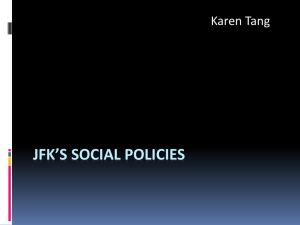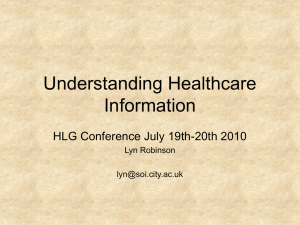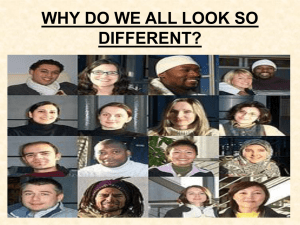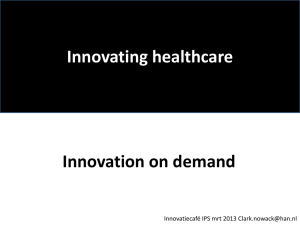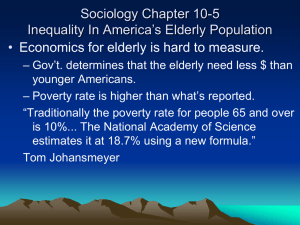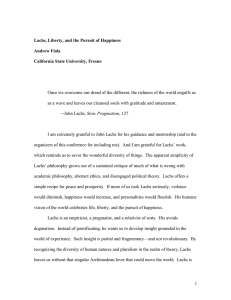Healthcare Inequalities in the Elderly
advertisement
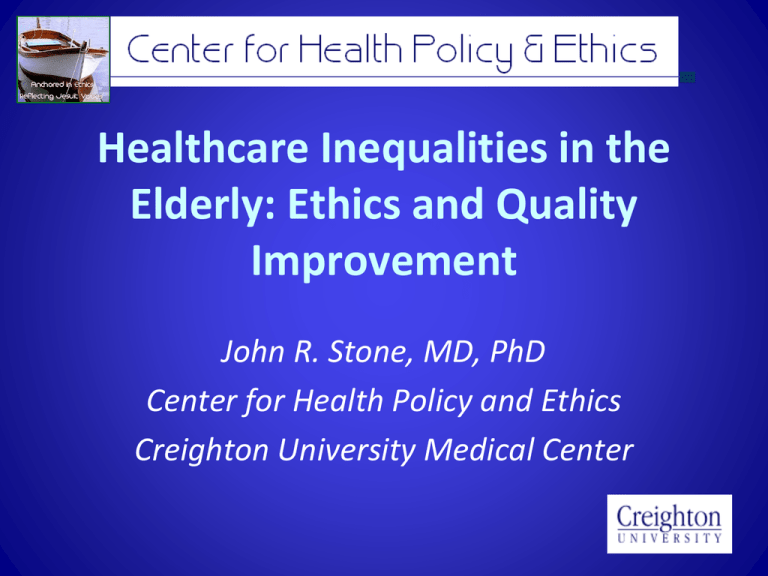
Healthcare Inequalities in the Elderly: Ethics and Quality Improvement John R. Stone, MD, PhD Center for Health Policy and Ethics Creighton University Medical Center Conflicts of Interest • None known Learning Objectives • Explain evidence & racial/ethnic issues • Describe an ethical framework • Explain implications Case 1: CML • Probability of being offered full spectrum of effective drugs – @ 75 versus @ 50 Stone 2012, Cambridge Quarterly of Healthcare Ethics Case 2: In Rehab • 80, depressed or sometimes irritable • Rehabilitation professional – Regard as positive as at 45? Stone 2012, Cambridge Quarterly of Healthcare Ethics Case 3: 65 Breast Ca_AA Woman • Excisional biopsy • Breast tissue conservation • Radiotherapy – Same % advice as if White? Stone 2012, Cambridge Quarterly of Healthcare Ethics Case 4: Rheumatology • “Aggressive” and “effective” care • Same for older as for younger patients? Stone 2012, Cambridge Quarterly of Healthcare Ethics Case 5-Chronic Disease • At age 72, will treatment be as established by research as at age 50? Stone 2012, Cambridge Quarterly of Healthcare Ethics Case 6: Institutional • • • • Excellent tertiary hospital Rigorous Quality Improvement (QI) QI includes age-related care? QI includes care per race/ethnicity? Stone 2012, Cambridge Quarterly of Healthcare Ethics Evidence Status • Need more studies • Existing data and care quality – Bad to be elderly – Worse to be elderly + racial/ethnic minority • Uncertain – (Probably) worse: elderly, racial/ethnic minority, poor Withholding Care & Ethics • Fair distribution among age groups • Unfair: merely because a person is old – Christine Cassel: illegitimate “implicit rationing” Cassel 2005 If you’ve seen one 70 year-old… • “No ailment should ever be written off as an "old age" ailment. Treating patients based on their age means you can miss very significant, treatable situations. …If you've seen one 70year-old, you've seen one 70-year-old. Mark Lachs 2010 • “Every patient is different, and I hate the way the health care system pigeonholes people based on a number, and it becomes more absurd as patients get to be 70, 80 and 90, with great variations in their functional ability.” Mark Lachs 2010 Elderly Ageism • Bias, prejudice, discrimination, devaluation • Negative attitudes, stereotypes: dependent, grumpy, lonely, rude, stubborn, socially inactive, frail noncontributors* • Mistaken beliefs: asexual *Eymard & Douglas 2012 Causes: Elderly healthcare disparities • Elderly ageism • Education/training deficit – Knowledge – Skllls • Insufficient Research • Inadequate review Causes: Elderly R/E Health Disparities • • • • • • Stereotypes Bias Discrimination Personal level Institutional level Policy level? Moral Framework • • • • • • Respect for persons Justice Beneficence Nonmaleficence/do-no-harm Care Solidarity Ethical Framework/Anchors Respect for Persons Solidarity Justice Beneficence Do-no-harm Care Respect for Persons Not just respect for autonomy Empower Respect Listen Humility Engage Culture bridging for Persons Recognize Justice • Fair application of respect for persons and other professional ethical values – Health/healthcare equity • Remediation if unjust inequality or inequitable treatment Beneficence/Nonmaleficence • • • • Advance the patients’ good Do no harm when avoidable Minimize harm In light of respect for persons and justice Care • • • • • Needs of particular others/personal Empathic/emotional connection Thoughtfulness/considerateness Focus on vulnerable/dependent Attention to quality/groups Stone 2012, Cambridge Quarterly of Healthcare Ethics Solidarity • • • • Alignment/unity/fellowship Empathic bridging across distance Opposes them/us Focus: most disadvantaged Stone 2012, Cambridge Quarterly of Healthcare Ethics Foci of Equal Quality • • • • Patients you see Institution System State/nation Quality Intent Outcome Race/Ethnicity Example • “I treat everyone equally.” • “I do not vary treatment quality with people’s race/ethnicity and so forth, but I attune to their individual needs.” • “My system/institution does not do quality assessments regarding race/ethnicity or age group.” Quality Improvement QI Outcome Indicator Assessment Remediation Reassessment Quality Improvement • Age • Race/ethnicity • Other – Language – Gender – Socioeconomic status Quality Improvement/Elderly & R/E* Departments Institution Evidence Ethical Framework Community *Disparities Solutions Center. Outcomes Recommendations Improving Attitudes & Views • Enhanced curricular content • Simulations: “The Aging Game” and others • Narrative reflection *Eymard & Douglas 2012 Recommendations: Direct Care Sites • Open group inquiry/discussion • Iterative group value assertion • MMM: Mindful Mentoring & Modeling Recommendations • Individual clinician – Communicate, engage, connect, honor, empower – Care, empathize – Bridge cultural and age divides – Reflect (respect, justice, care, solidarity) Recommendations • Individual clinician –Mentor/model –Narrative reflection –Humility/self-critique Recommendations • Department/Division –Curricular content –Faculty development –Value clarification –Legitimize discussion Recommendations • Department/Division –Mentor/model –Promote QI –Promote elderly research Recommendations • Institution –Quality improvement –Community involvement –Department/Division inclusion –Elderly research Higher Levels •Policy review References • Cassel CK. (2005) Medicare Matters: What Geriatric Medicine Can Teach American Health Care. Berkeley: University of California Press. • Disparities Solutions Center. Massachusetts General Hospital. Boston. (See several documents regarding healthcare disparities.) http://www2.massgeneral.org/disparitiessolutions/resources.html#imqual • Eymard, A. S., & Douglas, D. H. (2012). Ageism among health care providers and interventions to improve their attitudes toward older adults: An integrative review. Journal of Gerontological Nursing, 38(5), 26-35. Mark Lachs 2010: “Ageism in Medicine: How It Appears, Why It Can Hurt You: Interview with gerontologist Mark Lachs.” Maureen Mackey. AARP Bulletin. November 18, 2010. http://www.aarp.org/entertainment/books/info-112010/author_speaks_ageism_in_medicine.html (04Aug2012) Powers, Madison; Faden, Ruth. (2006) Social Justice: The Moral Foundations of Public Health and Health Policy. New York: Oxford Univ. Press. Stone JR. (2012). Elderly & Older Racial/Ethnic Minority Healthcare Inequalities: Care, Solidarity, and Action. Cambridge Quarterly of Healthcare Ethics. 21(3), 342-352. Stone, JR. (2012) Healthcare Inequalities in the Elderly. Ethical Times. Bulletin of the Program in Medicine & Human Values. California Pacific Medical Center. Sutter Health. 29(Spring), 1, 4-5. • • • •
